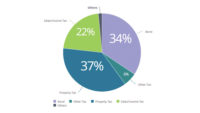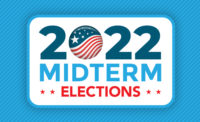
Voters on Nov. 4 will decide the fate of nearly $10 billion in statewide construction-related bond issues, led by a $7.5-billion water-projects measure in California, which has been suffering from a major drought. Also on some states' ballots are measures to fortify their transportation funds.
By far the largest bond proposal is California's Proposition 1. If approved, it would include $2.7 billion for water storage projects, $1 billion for watershed protection and ecosystem restoration, $520 million for drinking water and small-community wastewater programs and $395 million for flood management. A Sept. 23 Public Policy Institute of California poll said 58% of likely voters would vote for Prop 1, while 29% were opposed.
New York voters will consider a "Smart Schools" bond proposal, which would provide $2 billion to K-12 districts across the state for technology improvements, including building upgrades and equipment, and new classroom space. Each school district's equipment- construction spending split would depend on an "investment plan" it must submit to a state review board. The New York Building Congress, as of ENR presstime, was still reviewing the initiative.
Texas also has a Prop 1, a proposed constitutional amendment that would shift hundreds of millions of dollars a year in oil and gas tax receipts to the state highway fund from its rainy-day fund. It would provide an estimated $1.4 billion to $1.7 billion for non-toll highways in the first year.
Tom Johnson, Associated General Contractors of Texas executive vice president, says a recent poll shows Prop 1 has 74% support, up 10 points from several months ago. Supporters are spending $3 million to $4 million to back the proposal. But he says Prop 1's infusion still would leave the state highway program below its estimated $5-billion need.
"I would say we're hopeful and fairly positive" about Prop 1's chances, says Steve Stagner, American Council of Engineering Companies of Texas president. "What it really does is replace a … significant level of bonds and debt instruments and one-time sources of revenue that sustained our program for the last decade or so." He notes that energy severance-tax income isn't a stable revenue source, because it will rise and fall with oil and gas prices. But a Prop 1 defeat would mean a 35% drop in the Texas highway construction market, he says.
Maryland and Wisconsin voters will weigh measures that offer "an added level of protection to try and ensure that transportation funds aren't used for other purposes," says Alison Premo Black, American Road & Transportation Builders Association chief economist.
Gambling enthusiasts in Massachusetts may never set foot inside a $225- million slots parlor in Plainville set to open next June, or other planned facilities, if voters repeal the state's expanded gambling initiative, passed in 2011. Pro-casino interests have heavily outspent opponents as they campaign to defeat the measure. Two casinos are set to start construction after the election.
Backers of a New Jersey initiative to fund water quality upgrades, polluted-site cleanup and open-space preservation through corporate tax revenue are optimistic that the bipartisan measure—supported by 185 advocacy groups—will pass, despite critics who cite the state's fiscal problems. The proposal would fund up to $4 billion in environmental programs over 30 years.




